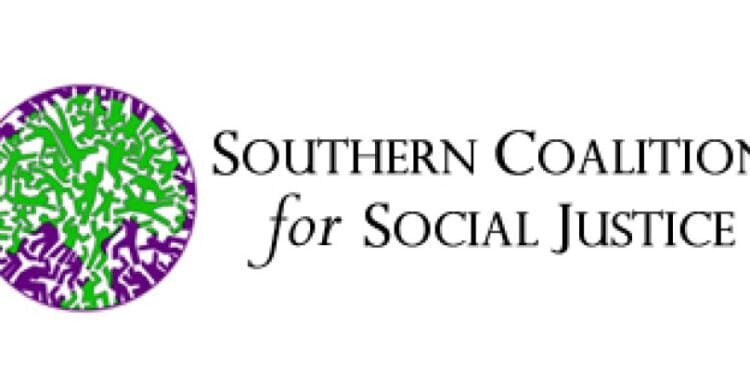The Southern Coalition for Social Justice (SCSJ) is a nonprofit dedicated to the expansion of civil rights located in Durham, North Carolina, and I have been watching their activities for a long time. They are truly on a mission to reform the criminal justice system, protect voting rights, racial profiling, and immigration reform.
Recently, I had the opportunity to interview Shoshannah Sayers, the Deputy Director at SCSJ. Although mostly composed of lawyers, they also have community organizers who assist with outreach to help aid vulnerable populations. Before we get into the interview, I want to share several reasons why I believe collective collaboration with various fields are needed in order to impact today’s societal problems.
Often, I talk about my work as a social worker, but I have never really discussed what fuels my passion and desire for systematic change. When I got of college, my first job was at a Youth Correctional facility until I was transferred to the Super Max facility which housed the worst of the worst inmates in the State of North Carolina.
It was a 24 hour lock-down supervision facility, and once I entered, I was locked-down with them too. To transfer an inmate, they had to be strapped down like Hannibal Lecter, and this is no joke. Then, I went into law enforcement as a patrol officer because I thought I could do more prevention, but this proved to be problematic for me too because of the systematic in flexibility.
After I finally started working in field in which I was educated for, social work, the realization hit me that these systems are not designed to do prevention.
As a third generation teen parent, I may not have a Phd behind my name, yet I feel uniquely qualified in understanding how education, social services, law enforcement, and the criminal justice system aids oppression and retards vulnerable population’s ability to rise above their circumstance. Pulling yourself up by your bootstraps is not possible without opportunities and a support system. These systems can not be reformed from within because one must either conform, leave voluntarily, or against their will.
My hope is that macro-practice social work and organizations such as SCSJ will begin to collaborate and share resources by realizing you are working to uplift the same demographics. Here is the Q&A with SCSJ on their mission and vision for the future. Spoiler Alert…They will have their first MSW Macro intern starting in the fall.
SWH: Tell me about a bit about the mission and goals of the Southern Coalition for Social Justice, when it was formed, and your role there.
SS: The Southern Coalition for Social Justice, or SCSJ, is a 501(c)3 nonprofit organization founded in August 2007 in Durham, North Carolina, and I was privileged to be part of it. We were a multidisciplinary group, predominantly people of color, who believed that families and communities engaged in social justice struggles need a wide variety of tools to be successful in overcoming structural racism. We saw the need for a team of lawyers, social scientists, community organizers and media specialists to support them in their efforts to dismantle structural racism and oppression.
Most importantly, this diverse group of experts needed to be willing to listen to what each community wanted instead of “parachuting in” and telling a community how we experts thought the problem should be addressed. SCSJ was born from this deep passion for listening to communities first and foremost. We do give advice and provide multiple options, but in the end it is the community that decides how their issue will be addressed and our commitment is to provide the highest quality tools available to execute the community’s plan of action.
I was a board member from the organization’s founding in 2007 until early 2013, when I resigned from the board in order to pursue a staff position with SCSJ. I am currently the Deputy Director, and quite honestly it’s my dream job – I get to help people and support our mission every single day. I also get to work with some of the most dedicated, passionate social justice advocates I have ever met.
SWH: What kind of tools and research do you guys use in helping to support the cases and projects that you take on?
SS: Because our staff includes a variety of experts, we are able to bring many tools to the table. We have a policy analyst/researcher who uses GIS maps to give visible representations of inequality in the system. For example, he was able to create maps showing where marijuana arrests take place and then lay that over a map of where high concentrations of African American communities. The result is a clear visual depiction of the practice of targeting African American neighborhoods for marijuana arrests. Being able to see this on a map is so much more powerful that reading statistics in a report.
Other tools include our legal team, which engages in social justice litigation ranging from voting rights to environmental justice to criminal justice reform. And our bilingual community organizer is able to mobilize local communities on issues from immigration reform to job opportunities for formerly incarcerated people.
SWH: Social Workers were originally the staples in the social justice movement, and now social justice advocate positions tend to be held by attorneys. In what ways have you guys engaged macro community practice social workers or would like to engage for collaboration or partnerships?
SS: This is an exciting area that we are just beginning to explore. Our first macro social work student will begin her practicum with us in the Fall 2013 semester, and we are excited about the new tools she will bring to the table. Her work will largely be around helping formerly incarcerated people organize and gain the tools they need to successfully reintegrate into society. Based on her experiences, we plan to create a plan to more widely integrate macro social work into our efforts.
SWH: What are two of the highest advocacy priorities of the coalition at this time?
SS: Right now our two highest priorities include one litigation strategy around voting rights issues and one community organizing effort around empowering formerly incarcerated people. We have been involved in redistricting litigation since 2011, where our goal is to get over 40 North Carolina voting precincts redrawn in a more fair and equitable way. In our opinion, the current redistricting plan attempts to dilute the vote of African Americans by cramming them all into a few districts and leaving their voice unheard in many other districts. We had a trial on part of this case during the week of June 10, 2013 and we hope to hear back on the success of that effort very soon.
Our second effort is around solutions to the epidemic of unnecessary drug arrests in communities of color. The general population of North Carolina is 68.5% white, 21.5% black and 8.4% Latino, while the state’s prison population for drug-related offenses is 28.5% white, 53.2% black and 17.6% Latino. Communities of color are obviously disproportionately represented in the criminal justice system, which makes these communities more likely to face the harsh, sometimes lifelong collateral consequences triggered by a criminal conviction. Last year we supported a bill in the general assembly that would have gotten rid of criminal penalties for possession of small amounts of marijuana, replacing these with civil penalties and fines that did not involve a criminal conviction. In the current political climate, this bill died in committee.
As we regroup and wait to see what the legislature will look like in the next long session, we need to find more immediate remedies. Our first community organizing effort was a successful Ban the Box pilot in Durham, NC. Ban the Box campaigns ask local government employers to remove the check-box question, “have you ever been convicted of a crime?” from their employment applications. This gives formerly incarcerated people the chance to get a job interview where they can explain, in person, the nature of their record rather than being automatically excluded without ever getting an interview. Once we were able to pass Ban the Box in Durham, it was taken up by other communities across the state and we now have 6 municipalities participating. SCSJ continues to organize communities to expand Ban the Box.
Building on this success, our new community organizing project is to make marijuana possession a “lowest law enforcement priority.” This means that the police would be seeking out people committing more serious offenses rather than seeking out marijuana possession. We plan to use the same community organizing model (and probably work with many of the same communities) for the LLEP initiative as we have used for the Ban the Box initiative. Together, this type of community organizing can make important strides in reducing the collateral consequences of incarceration while we await a General Assembly that may be more interested in these issues.
SWH: What vision does the coalition have for the future?
SS: Our vision is simple: Communities will succeed in realizing their own goals and people will know from experience that they can make a difference on issues that matter to them. I think of it like this: once a community works with SCSJ and has a victory, they will know that THEY hold the power to make real chance. They will go forward, either with our help or on their own, to make more and more positive social change.
SWH: If readers want to follow your activities and projects, how do they find you on the web?
SS: I encourage people to visit our website at www.southerncoalition.org. We are also available on Facebook at www.facebook.com/southerncoalition and on twitter at https://twitter.com/scsj. Readers are also invited to join our LinkedIn Group at https://www.linkedin.com/groups/Southern-Coalition-Social-Justice-5021808
I have attached below a powerful speech by Daryl Atkinson who is now one of the attorneys working at SCSJ. Daryl spent 40 months in an Alabama Prison before getting his associates, bachelors, and law degrees. Listen to his story and plea for change:




